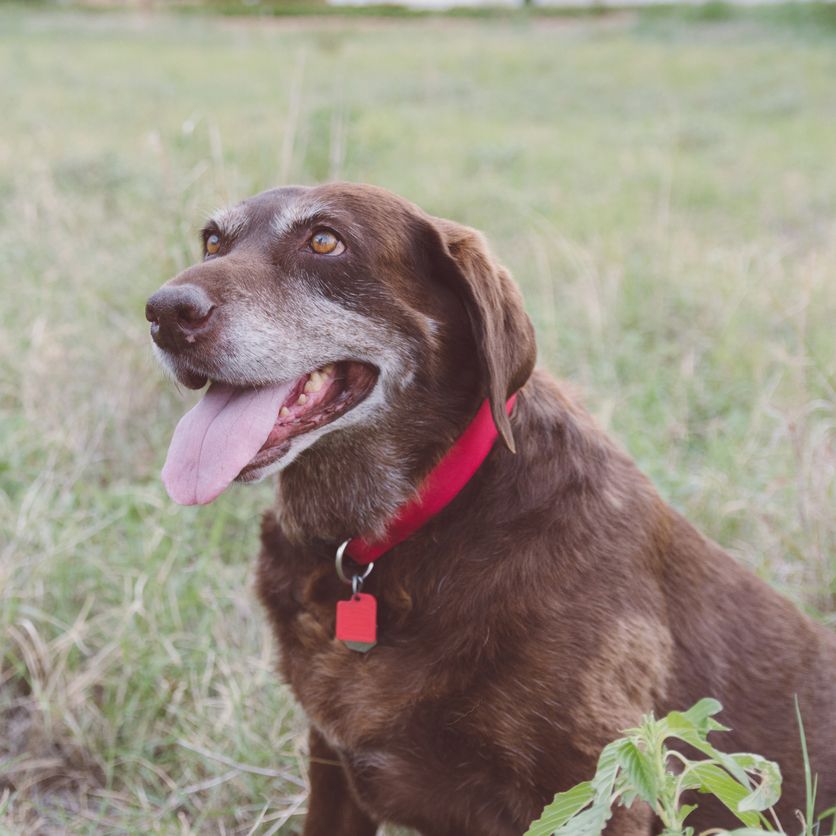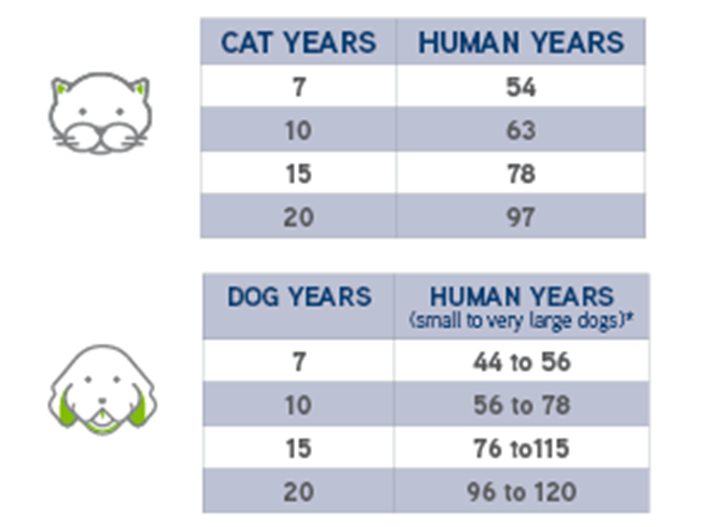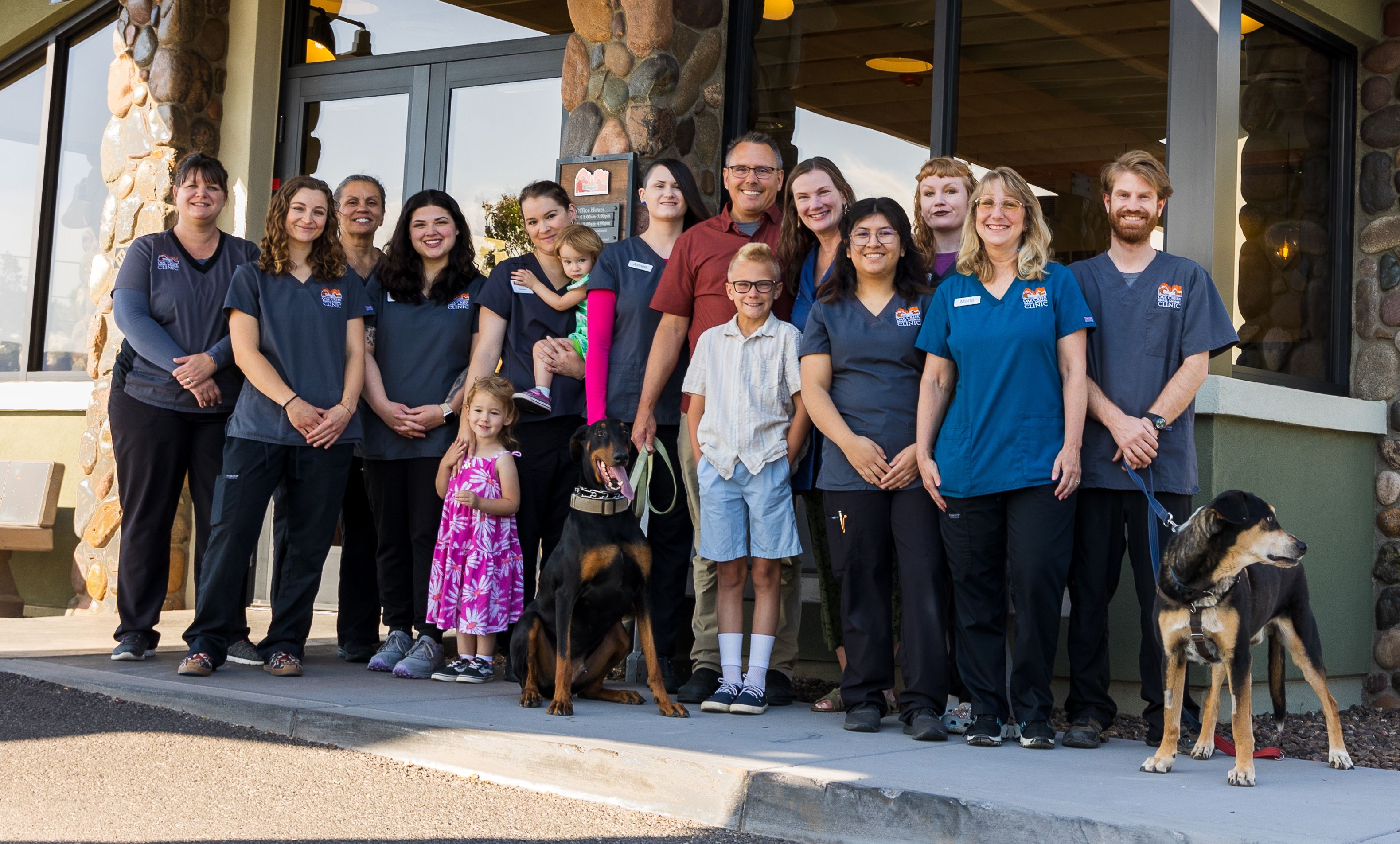
Caring for a Senior Pet
November 19th, 2022

HOw Old is My Pet?
A good start is to know how old your pet is. Here is an age chart from the AVMA for cats and dogs:

Age: Estimated Human Equivalent for Older Pets
*Small 0-20lbs; Medium: 21-50 lbs; Large 51-90lbs; Very Large: >90lbs
Modern veterinary medicine is helping pets to live longer.
These advances mean we can enjoy our pets being a part of the family longer. But with longer lifespans, we see more pets develop problems common to aging. For this reason, we want to educate pet parents on caring for a senior pet.
Changes to Watch for in Senior Pets
Here are some common changes to expect as your pet ages.
1. Impaired sight and/or hearing
Like humans, it is normal for pets to lose some of their sight and hearing as they age. Older pets can develop cataracts. Regarding their hearing, they may not respond as well to voice commands. But pets usually have a good sense of smell. They will depend on this more as they age. They will use scents to be familiar with things around them. You can help them by limiting changes to their environment.
2. Arthritis
Typical signs of arthritis are difficulty moving or limping. A pet with arthritis may also show irritation when touched or petted (especially over the arthritic areas) and may seem more depressed or irritable.
Two significant contributors to arthritis are a sedentary lifestyle and obesity. If your pet is overweight, talk to your veterinarian to ensure you have your pet on the proper diet and exercise.
3. Incontinence
You may notice urine dribbling. Older pets can develop weak pelvic floors or poor bladder tone, resulting in urinary incontinence. However, there are other causes of incontinence, such as urinary tract infections. So, if you notice any continence changes, please call us.
4. Dementia
Dementia may not be as common as the other symptoms above but as pets are living longer you should be aware of symptoms of dementia.
DOGS:
- Sleeping more within 24 hours.
- Losing interest or becoming apathetic.
- Intermittent anxiety expressed by apprehension, panting, moaning, or shivering.
- Forgetfulness, such as forgetting commands, not recognizing objects, and getting stuck behind furniture.
- Becoming overly aggressive.
CATS:
- Disorientation, such as failing to recognize people or places and getting lost.
- Less interaction with other pets or people.
- Change in sleep habits. May sleep more during the day but wander around more at night, often accompanied by crying out for no apparent reason.
- Loss of housetraining skills. They forget where the litter box is or have lost interest in keeping themselves clean.
Seven Tips for Helping Your Pet as They Age
1. More Frequent Vet Visits. Yearly checkups are essential to keep your pet healthy. However, as pets age, they become more susceptible to diseases and other medical conditions. Consult your veterinarian about how often you need to bring your pet in for a wellness check.
2. Monitor Your Pet’s Weight. According to the AVMA, weight can tremendously affect an older pet’s health. Obesity in older pets increases the risk of arthritis, difficulty breathing, insulin resistance or diabetes, heart disease, high blood pressure, skin problems, cancer, and other conditions.
Sudden weight loss in an older pet is also a concern, especially for cats. An overactive thyroid gland), diabetes, and kidney disease are common causes of weight loss in senior cats. Contact us if you notice any sudden changes in your older pet’s weight
3. Keep Them Mobile. Whatever physical activity they can manage, keep them at it. Ensure you adjust their exercise to their abilities. They may have once been able to go on runs with you but now may only be able to tolerate a slower or shorter walk.
4. Get Them Laser Therapy at Our Clinic. Laser Therapy can reduce inflammation and relieve pain in older pets without the use of drugs. You can learn more about our laser therapy from our blog: Aspen Laser Therapy.
5. Keep their Teeth and Gums Healthy. Keep their Teeth and Gums Healthy. Dental disease is the number one problem in dogs and cats. While we don’t expect your pet’s mouth to smell minty fresh, neither should it be foul-smelling. Foul-smelling breath and discolored teeth are signs of dental disease. Dental disease can become very painful for your pet and contribute to heart and respiratory disease and affect other organs.
6. Help Them with Grooming. As pets age it can become difficult for them to groom themselves properly, so you may need to help them with their grooming more frequently.
7. Adjust Their Environment as Needed. You may need to make some environmental adjustments as your pet ages and they cannot see, hear, or move as well as they use to. Here are some possibilities:
- Get them a pet stair or ramp. If your pet is used to getting up on your bed or couch to snuggle, a pet stair or ramp can help them manage. Stairs can also help dogs get in and out of your car.
- Make Their Environment Safe. Always keep dogs on a leash when they are outdoors. Keep your cat in a secured patio (catio), porch, or indoors. There are also cat fences, such as The Purrfect Fence, available to keep them safe in your yard.
- Provide them with a comfortable bed. An orthopedic or heated bed could make a big difference in their sleeping comfortably and relieving arthritic pain.
Final Words
We have covered symptoms to watch for as your cat or dog ages. Many of them can apply to other animals too. However, do not try to diagnose your pet yourself. There can be more than one cause for any one of these symptoms. But you can help your pet by observing what is going on with them and giving this data to us so we can accurately diagnose your pet.
We are here to help you keep your pet healthy through its golden years. Please don’t hesitate to contact us if you have any questions or need to schedule a visit.
Sincerely,
Your Friends at
Oak Creek Small
Animal Clinic


